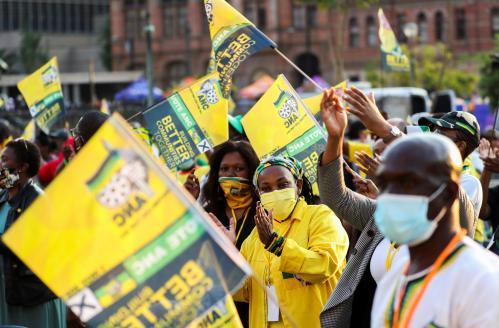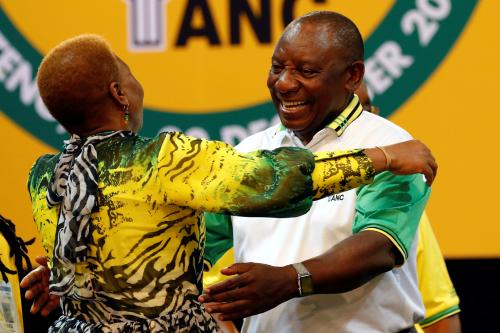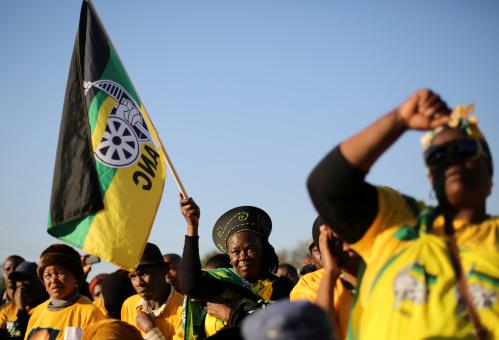Elections are usually a contest between competing parties. Sometimes, though, they are fundamentally about a battle for power within a party. In the case of South Africa’s May 8 election, the future of the ANC is in the balance.
No fewer than 48 parties are contesting the election in which each voter will cast two ballots, one for the national legislature and the other for their provincial legislature. South Africa uses a closed list proportional representation system: Voters choose a party, not a candidate. Parties are allocated seats in the national and nine provincial legislatures in proportion to their share of the vote.
Notably, only a fraction of the parties will win enough votes to take a seat: Right now, 13 parties are currently represented in the national parliament. In addition, although elections are becoming more competitive, only two parties, the governing African National Congress (ANC) and the official opposition in the national parliament, the Democratic Alliance (DA), govern provinces: The ANC controls eight and the DA only one. Only three parties won more than 2.5 percent of the vote in the last national elections in 2014—the ANC with 62 percent, the DA with 22 percent, and the Economic Freedom Fighters (EFF), a breakaway group that parted ways with the ANC, with 6 percent.
So, despite the plethora of parties and a hotly contested campaign in which parties behave as if the result hinged on a few votes, the election is, really, a contest between two parties, one of which usually wins three times the vote of the other. To understand the dynamic between the two factions vying to control the governing party, further context is needed.
The ANC in decline
Since South Africa became a democracy in 1994, the ANC has won all national elections and has governed all but two provinces continuously (in addition to the DA-controlled Western Cape, it was in opposition in the KwaZulu-Natal province from 1994 to 1999).
South African party politics is shaped by identities—parties appeal to very clear sections of the electorate. Race, region, and language are the primary shapers of political loyalty, but smaller parties are able to appeal to various sub-identities. The ANC, which dominated the anti-apartheid movement fighting against racial minority rule, takes pride in being the oldest national freedom movement in the world (it was formed in 1912). As such, the party enjoyed a decades-long position as the largest vehicle for the political identities of most black South Africans. This legacy has ensured the ANC a “natural” electoral majority, solidified by the fact that the largest opposition party, the DA, emerged out of the whites-only political order and is often associated with whites and other racial minorities. While the DA has more black members now and is led by a black man, Mmusi Maimane, this identification largely survives.
The EFF emerged out of conflict within the ANC. Its top brass, including head Julius Malema, were leaders in the ANC Youth League but were driven out by then-president Jacob Zuma. Seen by a largely adoring media and many voters on social media as a left-wing party, the EFF is essentially a vehicle for black middle-class voters who believe, with good reason, that a quarter century of democracy has not demolished racial barriers in business and access to professions such as law and medicine Given its origins, the party indeed provides an option for disaffected ANC voters wanting to retain their political identity. But, despite these assets and much favorable media coverage, the EFF is very far from being a serious contender for a role in government.
Despite its considerable advantages, the ANC vote has been under pressure since Zuma became its president in 2007 and subsequently when he was elected South Africa’s president in 2009.
Zuma’s ascent prompted two splits in the ANC that siphoned off votes to two break-off parties —the EFF and the Congress of the People. The patronage politics favored by Zuma and his allies alienated many ANC voters who associated Zuma’s leadership with corruption and “state capture,” the use of public power and resources for private ends. In 2016, when local elections were held, this disaffection drove the national ANC vote down to 54 percent (from 70 percent when Zuma took over in 2007): The DA’s share rose from 22 to 27 percent and the EFF’s from 6 to 8 percent.
This recent erosion in popularity of the country’s biggest party raised the real prospect that, in this year’s national election, the ANC could lose over 4 percentage points and thus its parliamentary majority. However, in 2017, a faction opposed to Zuma began to mobilize support behind then-ANC Deputy President Cyril Ramaphosa, who opposed—and ultimately defeated—the Zuma faction’s candidate at the ANC’s December 2017 conference. Ramaphosa’s narrow victory was achieved only through the actions of David Dabede Mabuza, then leader of the ANC in Mpumalanga province and a key figure in the Zuma camp. Convinced that if the Zuma faction led the ANC into the next election it would lose its national majority, Mabuza allowed some of his provincial delegates to support Ramaphosa. In exchange, he secured an arrangement in which supporters of the two factions shared positions in the ANC leadership: Mabuza himself is now deputy president.
The ANC contests itself
Opinion polls and an analysis of the by-elections held regularly to replace municipal councilors who vacate their seats suggest that Ramaphosa’s election has done what Mabuza hoped it would: ensure an ANC majority on May 8. While it is in danger of being forced to seek a coalition partner in Gauteng province, the country’s economic heartland, the ANC is likely to win control of national government and all other provinces except the Western Cape, where it is already in the minority.
But this likely outcome does not make the election unimportant: On the contrary, it could decide how the country is governed for quite a while.
The deal Mabuza brokered in 2017 means that Ramaphosa and his allies control the government, allowing them to change the national cabinet, make new appointments to enhance the effectiveness of prosecuting authorities, and substantially adjust the leadership of state-owned enterprises to remove people accused of corruption. However, the Ramaphosa and Zuma factions remain strongly represented in the ANC’s leadership.
This election may shape the outcome of the battle between them. If the ANC improves on its 2016 result, Ramaphosa will be the first ANC president in 15 years to preside over electoral gains, which would likely solidify his hold on the presidency. More votes mean more seats for ANC politicians: This matters in all democracies, but particularly in South Africa where barriers to entry to the formal economy mean that the difference between holding a seat and losing it can be the difference between being middle class or poor. Notably, given few jobs and business opportunities, politics has become a route into the middle class: If you can earn the salary and benefits of a municipal councillor or a provincial or national legislator, you can afford a middle-class home and vehicle and better education for your children. If you lose the seat, you can’t find alternatives in the marketplace so you sink back into poverty.
If the ANC does not improve its position, Ramaphosa will be under pressure and could be defeated by the Zuma faction at the next ANC conference in December 2022. This result is crucial to the country’s immediate future as the factions hold very different attitudes to the economy and government.
The chief flaw in South Africa’s democracy is the survival of a sharp divide between economic insiders who benefit from the market economy and outsiders who do not. Ramaphosa and his allies represent the insiders. They have a stake in the health of the market economy and so oppose corruption and patronage politics that threaten it. Since Ramaphosa took over, he has embarked on a program to strengthen the rule of law and loosen the hold that political patronage has on the state. By contrast, among Zuma and his allies, economic exclusion represents an opportunity for patronage politics, since those economically excluded tend to attach themselves to politicians (and party factions) in the hope of gaining access to resources. If the Zuma camp regains control of the ANC, patronage politics is likely to return—at least until the electorate can remove its adherents from office.
So, while the election campaign shows all the signs of a highly competitive battle between the government and opposition, in reality, it is a fight between the forces of patronage and their opponents within the ANC. The stakes are high even though the governing party’s re-election is almost certainly assured.
Note: This blog reflects the views of the author only and does not reflect the views of the Africa Growth Initiative.









Commentary
South Africa’s May 8 election will decide the future of the ANC
May 5, 2019